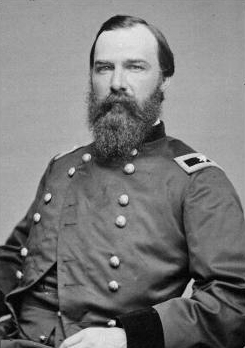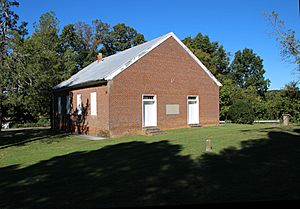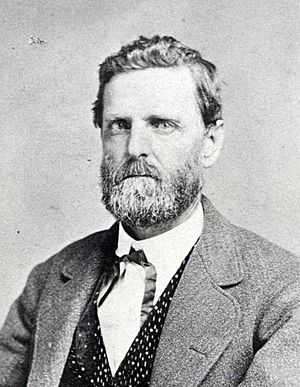Battle of Morristown facts for kids
Quick facts for kids Battle of Morristown |
|||||||
|---|---|---|---|---|---|---|---|
| Part of the American Civil War | |||||||
 |
|||||||
|
|||||||
| Belligerents | |||||||
| Commanders and leaders | |||||||
| Alvan C. Gillem | John C. Vaughn | ||||||
| Strength | |||||||
| ~2,800 | ~1,700 | ||||||
| Casualties and losses | |||||||
| ~26 total 8 killed 18 wounded |
~309 total 85 killed 224 wounded and captured |
||||||
The Battle of Morristown was a fight during the American Civil War. It took place in what is now Hamblen County, Tennessee. On October 28, 1864, Union soldiers attacked Confederate forces.
Union General Alvan C. Gillem led his troops against Confederate General John C. Vaughn. Vaughn's soldiers were defending Morristown, Tennessee. The Union forces won the battle. They chased the defeated Confederates into nearby Russellville, Tennessee.
Contents
Why Morristown Was Important
Morristown, Tennessee, was a very important place during the Civil War. It was located where the East Tennessee and Virginia Railroad crossed a main road. This made it a key spot for moving troops and supplies. Soldiers were passing through Morristown as early as 1861. The town remained a vital military crossroads throughout the war.
In 1864, Andrew Johnson became Abraham Lincoln's running mate for president. Johnson wanted to remove Confederate soldiers from East Tennessee. He sent Brigadier General Alvan C. Gillem to help. Gillem's job was to bring back law and order. He also protected people loyal to the Union.
In October 1864, Confederate General John C. Vaughn captured a railroad station. This was at Bull's Gap. His troops then moved to Morristown. General Gillem moved his Union soldiers from New Market, Tennessee. He wanted to push Vaughn out of East Tennessee. Gillem's troops reached Mossy Creek (now Jefferson City) on October 27. They were just west of Morristown.
The Battle Begins

General Vaughn set up his defenses in two lines. The first line of Confederate soldiers was west of Morristown. It stretched for about a mile. The second line was east of the town. It also stretched for about a mile. This second line likely had cannons on both sides. One group of cannons was placed where Morristown College used to be.
On the morning of October 28, 1864, General Gillem's Union soldiers arrived. They came from the west around 9:00 AM. About 100 Confederates met them first. These soldiers were led by Colonel James Rose. They were sent to see how large the Union army was. This forced Gillem's troops to get ready for battle. Colonel Rose then returned to Vaughn to report the Union's strength.
Union Attack and Confederate Retreat
As the Union army got closer to the first Confederate line, Gillem's cannons opened fire. They shot at the Confederate left side. The Confederate cannons quickly fired back. A group of Union cavalry (soldiers on horseback) then charged. They attacked the center and right of the first Confederate line. The Union cavalry pushed the Confederate soldiers back.
The Confederates on the left tried to fight back. They used soldiers from their first line and cavalry from their second line. They attacked the Union right side. They pushed the Union line back a little. But they could not break through it.
Soon, the first Confederate line on the right side broke apart. Union cavalry chased them. The Union soldiers pushed into Morristown itself. There, mounted Confederates tried to counter-attack. But the Union forces kept moving. They tried to get behind the Confederate's far left side, south of the town.
Union cavalry charged all along the Confederate line. The Confederates could not hold their ground. Their final line gave way. It is thought that the second line broke first on its far left. Union cavalry were already behind them. They moved quickly to cut off any escape. The Confederate cannons east of town were captured. Morristown was also captured. Colonel Rose, whose horse was shot, was captured too.
The Confederates tried to retreat in an orderly way. But the Union pressure was too strong. Their retreat turned into a full-blown rout. They ran towards Russellville, Tennessee. General Vaughn later wrote, "I regret to say that my command was stampeded at Morristown this morning." Union forces chased them hard. The Confederates finally stopped at Russellville after getting more soldiers. The Union forces had successfully driven Vaughn out of Morristown.
What Happened Next
Vaughn's soldiers were completely defeated and driven out of Morristown. People in the area called this battle "Vaughn's Stampede." Vaughn's troops went to northeast Tennessee. There, they were joined by more soldiers. These new troops were led by Major General John C. Breckinridge.
From November 11 to 13, the Confederates attacked Gillem. This was at the Battle of Bull's Gap. In that battle, Gillem's forces were defeated. This became known as "Gillem's Stampede." He had to leave Morristown. Gillem's troops retreated to Strawberry Plains near Knoxville, Tennessee.
Soldiers Lost
About 18 Union soldiers were hurt, and 8 were killed. The Confederates lost more soldiers. Around 85 were killed. Another 224 were either hurt or captured.
The Battlefield Today

Today, there isn't much left of the battlefield in Morristown. Most of the land where the battle happened is now built up. One place that remains is Bethesda Presbyterian Church. This church was used as a hospital during the fighting. There are also many old graveyards in Hamblen County.
You can find a sign about the battle outside the Hamblen County Courthouse. It is part of the Civil War Trails Program. At Bethesda Presbyterian Church, Emma Jarnagin Cemetery, and Liberty Hill Cemetery, there are memorials. These honor unknown Confederate soldiers. Many of them died in the smaller fights around Morristown.
 | Kyle Baker |
 | Joseph Yoakum |
 | Laura Wheeler Waring |
 | Henry Ossawa Tanner |


